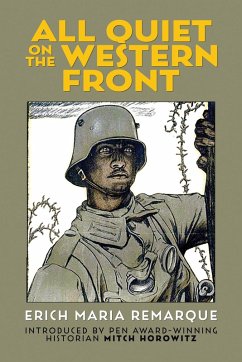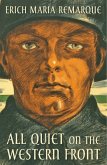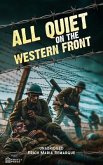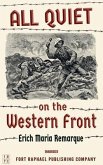One of modernity's greatest novels-fully reset with a new
introduction by PEN Award-winning historian Mitch Horowitz
History offers few records of war as vivid, haunting, and evocative as Erich Maria Remarque's All Quiet on the Western Front. Burned by the Nazis, feted by critics, embraced by millions, Remarque's dramatized record of the German frontlines in World War I is central to the experience of modern literature and history.
As enthralling to twenty-first century readers as it was to those who first encountered the book in 1928, Remarque's landmark tells the story of a young German volunteer who, with his comrades, moves from idealism to fatalism witnessing the horrors of mass killing and the intimate deaths of friends or the disfiguring survival of young men languishing in field hospitals. It is a work, finally, not just about World War I but about all wars-with a moral core that exposes the lies by which we live.
This reset edition presents the original, classic translation by Arthur Wesley Wheen. A new introduction by historian Mitch Horowitz frames the book's ethical insights and considers whether they impact humanity's viewpoint. "We cannot live with ourselves without also living with war's lessons, resounding in this book," he writes, "even as we prove incapable of acting on them."
In considering why works like All Quiet on the Western Front fail to reduce the possibility of war, Mitch opens a new window on a work of posterity nearly a century old-and on humanity's eternal predicament.
"Its autumnal mood of loss, pathos and quiet grief left a lasting impression on a legion of readers. Because its subject was war-all war-and the pain and waste that accompany it, the book breathed an air of conciliation welcomed among those who had been the enemy. There are some books, like Uncle Tom's Cabin and The Grapes of Wrath, that sum up a moment of passionate yearning. These books are beyond criticism; All Quiet is one of that company."-The New York Times
introduction by PEN Award-winning historian Mitch Horowitz
History offers few records of war as vivid, haunting, and evocative as Erich Maria Remarque's All Quiet on the Western Front. Burned by the Nazis, feted by critics, embraced by millions, Remarque's dramatized record of the German frontlines in World War I is central to the experience of modern literature and history.
As enthralling to twenty-first century readers as it was to those who first encountered the book in 1928, Remarque's landmark tells the story of a young German volunteer who, with his comrades, moves from idealism to fatalism witnessing the horrors of mass killing and the intimate deaths of friends or the disfiguring survival of young men languishing in field hospitals. It is a work, finally, not just about World War I but about all wars-with a moral core that exposes the lies by which we live.
This reset edition presents the original, classic translation by Arthur Wesley Wheen. A new introduction by historian Mitch Horowitz frames the book's ethical insights and considers whether they impact humanity's viewpoint. "We cannot live with ourselves without also living with war's lessons, resounding in this book," he writes, "even as we prove incapable of acting on them."
In considering why works like All Quiet on the Western Front fail to reduce the possibility of war, Mitch opens a new window on a work of posterity nearly a century old-and on humanity's eternal predicament.
"Its autumnal mood of loss, pathos and quiet grief left a lasting impression on a legion of readers. Because its subject was war-all war-and the pain and waste that accompany it, the book breathed an air of conciliation welcomed among those who had been the enemy. There are some books, like Uncle Tom's Cabin and The Grapes of Wrath, that sum up a moment of passionate yearning. These books are beyond criticism; All Quiet is one of that company."-The New York Times
Dieser Download kann aus rechtlichen Gründen nur mit Rechnungsadresse in A, D ausgeliefert werden.









